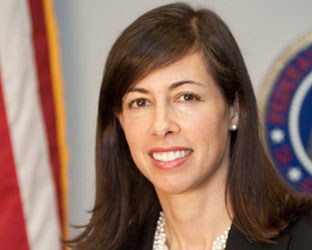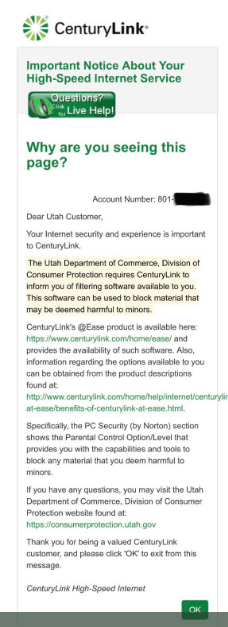
(Image courtesy of: Rick Snapp)
CenturyLink customers in Utah were rudely interrupted earlier this month by an ad for CenturyLink’s pricey security and content filtering software that left their internet access disabled until they acknowledged reading the ad.
Dear Utah Customer,
Your internet security and experience is important to us at CenturyLink.
The Utah Department of Commerce, Division of Consumer Protection requires CenturyLink to inform you of filtering software available to you. This software can be used to block material that may be deemed harmful to minors.
CenturyLink’s @Ease product is available here and provides the availability of such software.
As a result of the forced ad, all internet activity stopped working until a customer opened a browser session to first discover the notification, then clear it by hitting the “OK” button at the bottom of the screen. This irritated customers who use the internet for more than just web browsing.
One customer told Ars Technica he was watching his Fire TV when streaming suddenly stopped. After failed attempts at troubleshooting, the customer checked his web browser and discovered the notification message. After clicking “OK,” his service resumed.
A CenturyLink spokesperson told KSL News, “As a result of the new law, all CenturyLink high-speed internet customers in Utah must acknowledge a pop-up notice, which provides information about the availability of filtering software, in order to access the internet.”
In fact, according to a detailed report by Ars Technica, CenturyLink falsely claimed that the forced advertisement was required by Utah state law, when in fact the company would be in full compliance simply by notifying such software was available “in a conspicuous manner.”
CenturyLink chose to turn the Utah law to their profitable advantage by exclusively promoting its own product — @Ease, a costly ISP-branded version of Norton Security. CenturyLink recommended customers choose its Advanced package, which costs $14.95 a month. But parental filtering and content blocking tools are not even mentioned on the product comparison page, leaving customers flummoxed about which option to choose.
In effect, CenturyLink captured an audience and held their internet connection hostage — an advantage most advertisers can only dream about. CenturyLink countered that only residential customers had their usage restricted, and that because of the gravity of the situation, extraordinary notification methods were required.
But as Ars points out, no other ISP in the state went to this extreme level (and used it as an opportunity to make more money with self-interested software pitches).
Bill sponsor Sen. Todd Weiler (R), said ISPs were in compliance simply by putting a notice on a monthly bill or sending an e-mail message to customers about the software. Weiler added that ISPs had all of 2018 to comply and most had already done so. AT&T, for example, included the required notice in a monthly bill statement. CenturyLink waited until the last few weeks of the year, and used it as an opportunity to upsell customers to expensive security solutions most do not need.
With the demise of net neutrality, ISPs that were forbidden to block or throttle content for financial gain are now doing so, with a motivation to make even more money from their customers.
Just had @CenturyLink block my internet and then inject this page into my browser (dns spoofing I think) to advertise their paid filtering software to me. Clicking OK on the notice then restored my internet… this is NOT okay! pic.twitter.com/NtCZUeJF8I
— Rich Snapp (@Snapwich) December 9, 2018


 Subscribe
Subscribe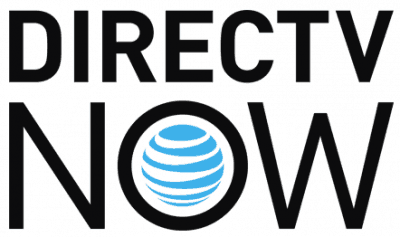 AT&T customers are telling Stop the Cap! the company is emailing their broadband customers to alert them they now qualify for unlimited internet access because they also happen to subscribe to DirecTV Now, AT&T’s streaming service targeting cord cutters.
AT&T customers are telling Stop the Cap! the company is emailing their broadband customers to alert them they now qualify for unlimited internet access because they also happen to subscribe to DirecTV Now, AT&T’s streaming service targeting cord cutters.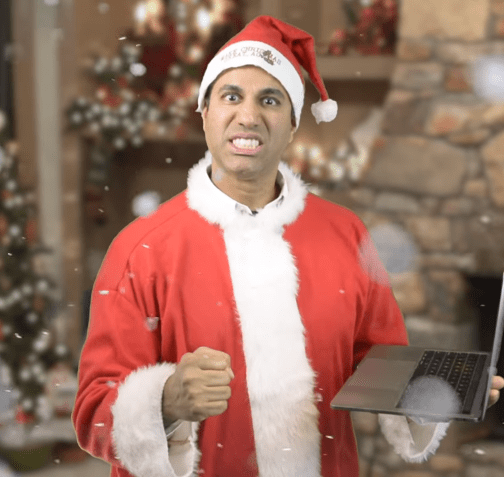
 Pai says giving companies like Verizon the permanent right to manage the kinds of text messages allowed on their networks is a good way to stop texting spam.
Pai says giving companies like Verizon the permanent right to manage the kinds of text messages allowed on their networks is a good way to stop texting spam.
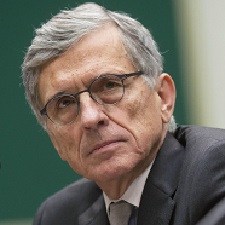

 “Even if it was passed by the House, the Republican-controlled Senate would not likely support it. Even if they miraculously passed a bill, President Trump would no doubt veto it, having previously spoken out against net neutrality,” Wheeler said. “The only foreseeable legislative path would be with the support of the network companies, and that support would come at the price of watering down the proposal to render it virtually meaningless.”
“Even if it was passed by the House, the Republican-controlled Senate would not likely support it. Even if they miraculously passed a bill, President Trump would no doubt veto it, having previously spoken out against net neutrality,” Wheeler said. “The only foreseeable legislative path would be with the support of the network companies, and that support would come at the price of watering down the proposal to render it virtually meaningless.” WASHINGTON (Reuters) – The U.S. Supreme Court on Monday refused a request by the Trump administration and the telecommunications industry to wipe away a lower court decision that had upheld Obama-era net neutrality rules aimed at ensuring a free and open internet, though the justices’ action does not undo the 2017 repeal of the policy.
WASHINGTON (Reuters) – The U.S. Supreme Court on Monday refused a request by the Trump administration and the telecommunications industry to wipe away a lower court decision that had upheld Obama-era net neutrality rules aimed at ensuring a free and open internet, though the justices’ action does not undo the 2017 repeal of the policy.